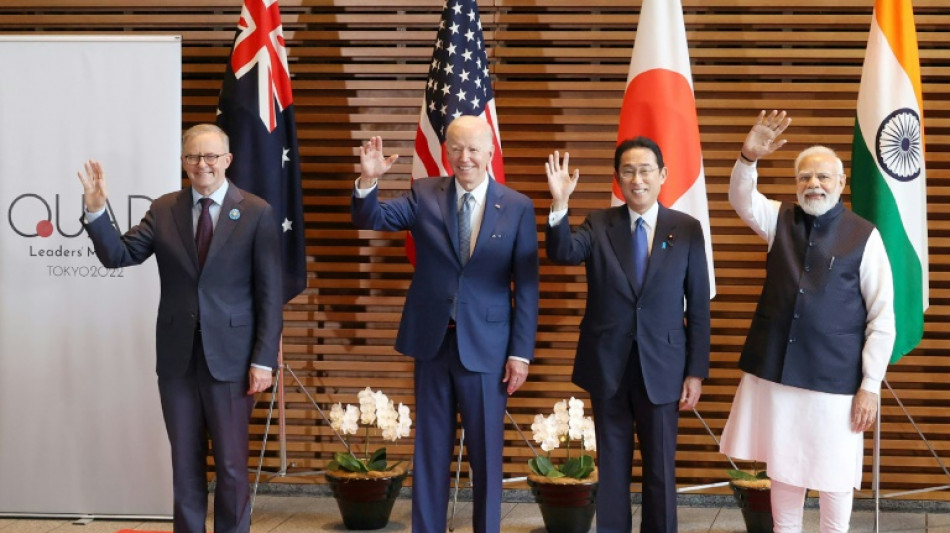
-
 Bangladesh begins three days of mass political rallies
Bangladesh begins three days of mass political rallies
-
Children learn emergency drills as Kashmir tensions rise
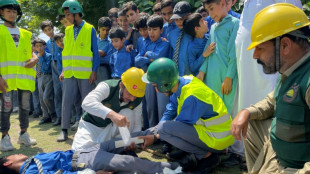
-
 Millions of children to suffer from Trump aid cuts
Millions of children to suffer from Trump aid cuts
-
Veteran Wallaby Beale set for long-awaited injury return
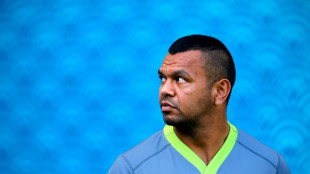
-
 Syria's Druze take up arms to defend their town against Islamists
Syria's Druze take up arms to defend their town against Islamists
-
Tesla sales plunge further in France, down 59% in April

-
 US calls on India and Pakistan to 'de-escalate'
US calls on India and Pakistan to 'de-escalate'
-
Israel reopens key roads as firefighters battle blaze

-
 Europe far-right surge masks divisions
Europe far-right surge masks divisions
-
James will mull NBA future after Lakers playoff exit

-
 Ukraine's chief rabbi sings plea to Trump to side with Kyiv
Ukraine's chief rabbi sings plea to Trump to side with Kyiv
-
Australian mushroom meal victim 'hunched' in pain, court hears

-
 Lakers dumped out of playoffs by Wolves, Rockets rout Warriors
Lakers dumped out of playoffs by Wolves, Rockets rout Warriors
-
Booming tourism and climate change threaten Albania's coast

-
 US reaching out to China for tariff talks: Beijing state media
US reaching out to China for tariff talks: Beijing state media
-
Tariffs prompt Bank of Japan to lower growth forecasts

-
 Kiss faces little time to set Wallabies on path to home World Cup glory
Kiss faces little time to set Wallabies on path to home World Cup glory
-
Serbian students, unions join forces for anti-corruption protest

-
 Slow and easily beaten -- Messi's Miami project risks global embarrassment
Slow and easily beaten -- Messi's Miami project risks global embarrassment
-
Fan in hospital after falling to field at Pirates game

-
 Nuclear power sparks Australian election battle
Nuclear power sparks Australian election battle
-
Tokyo stocks rise as BoJ holds rates steady

-
 Bank of Japan holds rates, lowers growth forecasts
Bank of Japan holds rates, lowers growth forecasts
-
'Sleeping giants' Bordeaux-Begles awaken before Champions Cup semis

-
 Napoli eye Scudetto as Inter hope for post-Barca bounce-back
Napoli eye Scudetto as Inter hope for post-Barca bounce-back
-
Germany's 'absolutely insane' second tier rivalling Europe's best

-
 PSG minds on Arsenal return as French clubs scrap for Champions League places
PSG minds on Arsenal return as French clubs scrap for Champions League places
-
UK WWII veteran remembers joy of war's end, 80 years on

-
 Myanmar junta lets post-quake truce expire
Myanmar junta lets post-quake truce expire
-
Rockets romp past Warriors to extend NBA playoff series

-
 Messi, Inter Miami CONCACAF Cup dream over as Vancouver advance
Messi, Inter Miami CONCACAF Cup dream over as Vancouver advance
-
UN body warns over Trump's deep-sea mining order

-
 UK local elections test big two parties
UK local elections test big two parties
-
US judge says Apple defied order in App Store case

-
 Seventeen years later, Brood XIV cicadas emerge in US
Seventeen years later, Brood XIV cicadas emerge in US
-
Scorching 1,500m return for Olympic great Ledecky in Florida

-
 Israel's Netanyahu warns wildfires could reach Jerusalem
Israel's Netanyahu warns wildfires could reach Jerusalem
-
Istanbul lockdown aims to prevent May Day marches

-
 Formation Metals Announces Appointment of Adrian Smith to Advisory Committee
Formation Metals Announces Appointment of Adrian Smith to Advisory Committee
-
Cerrado Gold Announces Q4 And Annual 2024 Financial Results

-
 Australian guard Daniels of Hawks named NBA's most improved
Australian guard Daniels of Hawks named NBA's most improved
-
Mexico City to host F1 races until 2028

-
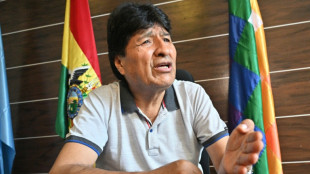 Morales vows no surrender in bid to reclaim Bolivian presidency
Morales vows no surrender in bid to reclaim Bolivian presidency
-
Ukraine, US sign minerals deal, tying Trump to Kyiv

-
 Phenomenons like Yamal born every 50 years: Inter's Inzaghi
Phenomenons like Yamal born every 50 years: Inter's Inzaghi
-
Ukraine, US say minerals deal ready as Kyiv hails sharing

-
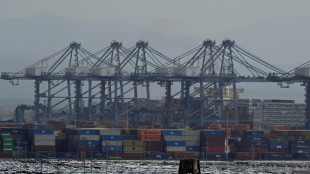 Global stocks mostly rise following mixed economic data
Global stocks mostly rise following mixed economic data
-
O'Sullivan says he must play better to win eighth snooker world title after seeing off Si Jiahui

-
 Sabalenka eases past Kostyuk into Madrid Open semis
Sabalenka eases past Kostyuk into Madrid Open semis
-
Netflix's 'The Eternaut' echoes fight against tyranny: actor Ricardo Darin


Quad nations warn on 'change by force' with eyes on China
Leaders of Japan, India, Australia and the United States warned Tuesday against attempts to "change the status quo by force" as concerns grow about whether China could invade self-ruled Taiwan.
A joint statement by the so-called Quad bloc avoided any direct mention of China's growing military power in the region, but left little doubt about where its concerns lie.
The carefully worded document also made reference to the conflict in Ukraine, but without offering any joint position on an invasion that India has pointedly declined to condemn.
The Quad's other members have been less coy about their view that a strong response to Russia's war is needed and sends a message that will deter other countries, including China.
"As Russia's invasion of Ukraine is shaking the fundamental principles of the international order... (we) confirmed that unilateral attempts to change the status quo by force will never be tolerated anywhere, particularly in the Indo-Pacific region," Japan's Prime Minister Fumio Kishida said.
The group's joint statement made no mention of Russia, or China, but listed a range of activities that Beijing has regularly been accused of in the region.
"We strongly oppose any coercive, provocative or unilateral actions that seek to change the status quo and increase tensions in the area, such as the militarisation of disputed features, the dangerous use of coast guard vessels and maritime militia and efforts to disrupt other countries' offshore resource exploitation activities," it said.
The four nations are attempting to build their loose grouping into a more substantive counterweight to China's rising military and economic power, despite their differences.
They unveiled plans to invest at least $50 billion into infrastructure projects in the region over the next five years and a maritime monitoring initiative seen as intended to bolster surveillance of Chinese activities.
The moves come with worries over recent efforts by China to build ties with Pacific nations including the Solomon Islands, which sealed a security pact with Beijing last month.
China's foreign minister will visit the Solomon Islands this week, with reports suggesting he could add other countries including Vanuatu, Samoa, Tonga and Kiribati.
- 'Democracies versus autocracies' -
In a nod to those concerns, Kishida earlier urged Quad members to "listen carefully" to regional neighbours, including the Pacific islands.
"Without walking together with countries in the region, the Quad cannot be successful," he said.
Australia's newly elected Prime Minister Anthony Albanese also said the bloc needed to "push our shared values in the region at a time when China was clearly seeking to exert more influence".
The Quad met a day after US President Joe Biden raised eyebrows and the regional temperature by saying Washington was ready to intervene militarily to defend Taiwan against any Chinese attack.
He insisted Tuesday that his comments did not mean a change to Washington's longstanding "strategic ambiguity" on how it might respond to a Chinese invasion, but Beijing reacted angrily nonetheless.
And if Biden was keen to avoid being seen as changing policy, he left little doubt about where the Quad's focus lies.
"This is about democracies versus autocracies, and we have to make sure we deliver," he said as the Quad summit began.
US strategy is for a "free, open, connected, secure and resilient Indo-Pacific. Russia's assault on Ukraine only heightens the importance of those goals."
There is growing regional discomfort with Chinese military activity including sorties, naval exercises and encroachments by fishing vessels that are viewed as probing regional defences and red lines.
The bloc said its new maritime monitoring programme would "promote stability and prosperity in our seas and oceans", again avoiding pointing the finger at Beijing while referencing illegal fishing -- an accusation frequently levelled at China.
The leaders are set to meet again in person next year, in Australia.
P.Martin--AMWN